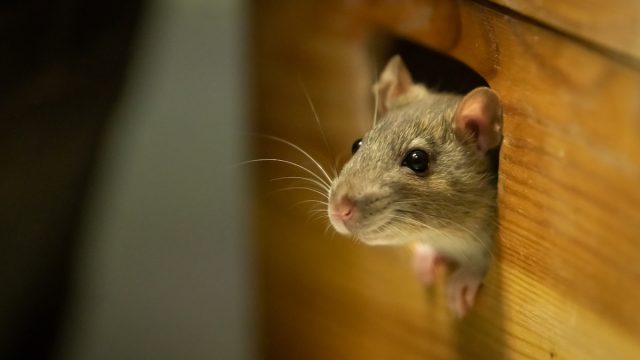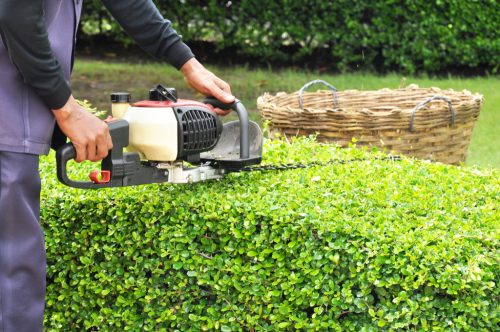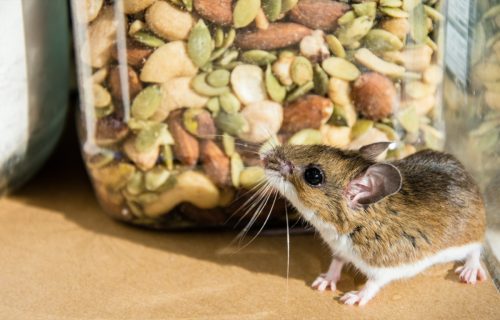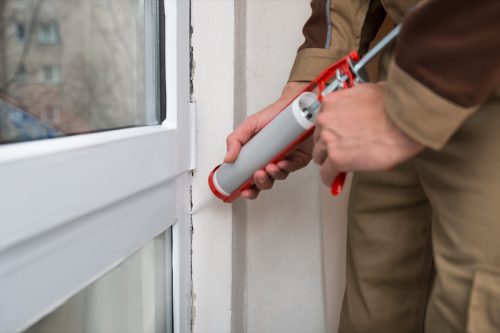5 Best Tips to Rodent-Proof Your House for Spring

While nicer spring weather means more time outside for you, it might mean more time inside for rodents. This is especially true since spring is the start of these critters’ breeding season, so they’ll be looking for safe and warm nesting spots. But if you’d rather avoid encounters with mice, rats, or any four-legged pests, there are a few easy ways to keep them out. Read on to learn experts’ best tips to rodent-proof your house for spring.
RELATED: 10 Cleaning Habits That Attract Mice to Your Home.
1
Spring clean your yard.

Brad Woods, district manager at Trutech Wildlife Services, says that rodents are likely to start their journey in your yard since they can find shelter under brush piles, amid long grass, and in shrubs. And after a long winter, your outdoor space probably isn’t in the best shape.
Therefore, Woods suggests trimming tree branches and other vegetation to remove possible hiding spots.
Lorne Hanewich, corporate trainer at Clark’s Termite & Pest Control, also recommends tending to overgrown bushes, piles of leaves and sticks, or anything else that can conceal a rodent.
2
Remove any food sources.

Experts say the most common rodent sightings during the spring are mice and rats, both of which are hungry. So, you’ll want to clean up any scraps or crumbs as soon as possible and make sure pests can’t access anything in your pantry.
Hanewich says to keep food in sealed plastic or metal containers. “Keep pantry staples like grains, cereals, and pet food off the floor and away from walls, as rodents can easily gnaw through cardboard and plastic bags to get to the goods,” he adds.
RELATED: 8 Foods That Are Attracting Mice Inside Your Home.
3
Keep garbage sealed.

If rodents don’t have direct access to food in your home, they’ll look for the next best thing: the garbage.
Scot Hodges, vice president of technical services and professional development at Arrow Exterminators, says this is a big concern with raccoons that “live in a constant search for food” and can “use their very adept hands to open garbage cans.”
Therefore, it’s crucial to ensure that garbage cans are closed and kept far away from any home entry points. “Use a thick plastic or metal garbage can with a tight lid—and always keep it sealed,” adds Hodges.
4
Seal any entry points.

It’s well known that rodents can slip through even the tiniest of openings, so it’s important to seal all possible entry points to your home.
“Check for gaps around doors, windows, pipes, and vents, and seal them with caulk, steel wool, or metal mesh,” advises Hanewich. “By blocking these entryways, you make it much harder for rodents to infiltrate your home.”
Hodges also recommends sealing any gaps “along the roofline, around the chimney, and areas where utilities and pipes enter the home.”
RELATED: 8 Surprising Things in Your Yard That Attract Mice to Your Home.
5
Declutter your home.

It’s the perfect time for that yearly spring cleaning you may have been putting off, especially in your basement, garage, and attic.
“Clutter provides rodents with hiding spots and nesting materials,” notes Hanewich.
Avoid organizing your things in cardboard boxes, which rodents can chew through. Instead, Hodges suggests using plastic boxes and containers with seal-tight lids and keeping them off the floor when possible.